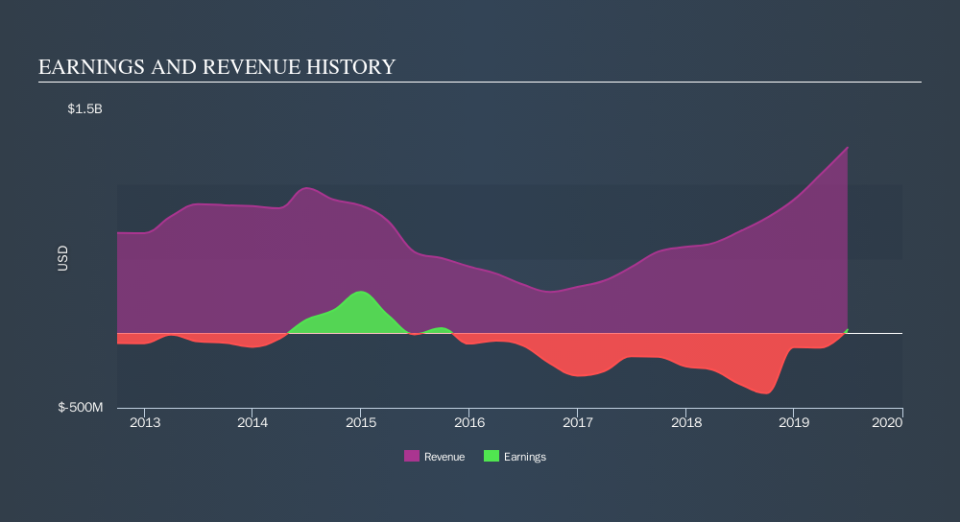Investors Who Bought Kosmos Energy (NYSE:KOS) Shares Five Years Ago Are Now Down 36%

Kosmos Energy Ltd. (NYSE:KOS) shareholders should be happy to see the share price up 13% in the last month. But over the last half decade, the stock has not performed well. In fact, the share price is down 36%, which falls well short of the return you could get by buying an index fund.
See our latest analysis for Kosmos Energy
While Kosmos Energy made a small profit, in the last year, we think that the market is probably more focussed on the top line growth at the moment. Generally speaking, we'd consider a stock like this alongside loss-making companies, simply because the quantum of the profit is so low. For shareholders to have confidence a company will grow profits significantly, it must grow revenue.
In the last half decade, Kosmos Energy saw its revenue increase by 5.9% per year. That's not a very high growth rate considering it doesn't make profits. Given this fairly low revenue growth (and lack of profits), it's not particularly surprising to see the stock down 8.4% (annualized) in the same time frame. Investors should consider how bad the losses are, and whether the company can make it to profitability with ease. Shareholders will want the company to approach profitability if it can't grow revenue any faster.
The company's revenue and earnings (over time) are depicted in the image below (click to see the exact numbers).
We know that Kosmos Energy has improved its bottom line lately, but what does the future have in store? You can see what analysts are predicting for Kosmos Energy in this interactive graph of future profit estimates.
What about the Total Shareholder Return (TSR)?
We'd be remiss not to mention the difference between Kosmos Energy's total shareholder return (TSR) and its share price return. The TSR attempts to capture the value of dividends (as if they were reinvested) as well as any spin-offs or discounted capital raisings offered to shareholders. Dividends have been really beneficial for Kosmos Energy shareholders, and that cash payout explains why its total shareholder loss of 34%, over the last 5 years, isn't as bad as the share price return.
A Different Perspective
While the broader market gained around 3.0% in the last year, Kosmos Energy shareholders lost 28% (even including dividends) . Even the share prices of good stocks drop sometimes, but we want to see improvements in the fundamental metrics of a business, before getting too interested. Unfortunately, last year's performance may indicate unresolved challenges, given that it was worse than the annualised loss of 8.0% over the last half decade. Generally speaking long term share price weakness can be a bad sign, though contrarian investors might want to research the stock in hope of a turnaround. Shareholders might want to examine this detailed historical graph of past earnings, revenue and cash flow.
If you would prefer to check out another company -- one with potentially superior financials -- then do not miss this free list of companies that have proven they can grow earnings.
Please note, the market returns quoted in this article reflect the market weighted average returns of stocks that currently trade on US exchanges.
We aim to bring you long-term focused research analysis driven by fundamental data. Note that our analysis may not factor in the latest price-sensitive company announcements or qualitative material.
If you spot an error that warrants correction, please contact the editor at editorial-team@simplywallst.com. This article by Simply Wall St is general in nature. It does not constitute a recommendation to buy or sell any stock, and does not take account of your objectives, or your financial situation. Simply Wall St has no position in the stocks mentioned. Thank you for reading.

 Yahoo Finance
Yahoo Finance 
